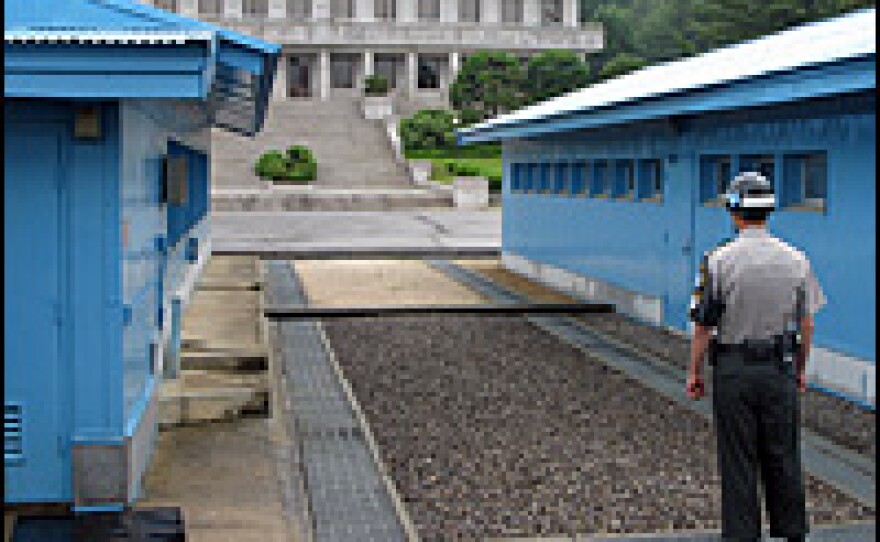

When President Obama and South Korean President Lee Myung-bak met Tuesday in Washington, the "grave threat" posed by North Korea's nuclear weapons program topped their agenda. The two leaders vowed to end the North's cycle of acting aggressively, only to be rewarded with incentives for backing down.
Some experts believe that the United States and North Korea's neighbors should be discussing what to do in the event of instability or even regime collapse in North Korea.
But concerns about antagonizing Pyongyang make it difficult to talk about such plans.
Inside The DMZ
As a busload of journalists rolls northward into the Demilitarized Zone separating the Koreas, South Korean army Cpl. Yoo Hyun-woo warns that tensions have been running higher since the North's May 25 nuclear test.
"The possibility of armed provocation from the Northern side is higher than ever inside the Joint Security Area," Yoo says, "so while on tour today, I would like to ask you for your cooperation."
The DMZ is 2 1/2 miles wide, with an array of anti-tank walls, minefields, fences and guard towers stretching 155 miles across the Korean peninsula. The bus full of journalists enters the Joint Security Area at Panmunjom, the truce village where the armistice ending the Korean War was signed and where the two Koreas' soldiers glower at each other over a concrete dividing line.
There have only been a few skirmishes in the Joint Security Area. But over the years, North Korean soldiers have infiltrated into South Korea across other parts of the DMZ. Experts say any future clashes are most likely to occur either along the DMZ or near the disputed maritime boundary between the two Koreas.
Yoo reminds visitors to be careful. "Please do not point at them or make any gestures towards the North Koreans. Do not try to communicate with the North Koreans, please."
The U.S. and South Korean militaries hold annual drills and have established plans for responding to a North Korean attack. They also have plans for what to do in case the regime in Pyongyang collapses, even though experts disagree about whether regime collapse is imminent.
Lee Woo-young, a professor at the University of North Korean Studies in Seoul, says South Korea will do what it has to in case of instability.
"South Korea has plans for taking in refugees and other related scenarios," he says. "But what's more important is, if there is a collapse, who will take responsibility for the situation: South Korea, the U.S. or China?"
Incomplete Planning
There are many different scenarios to consider, including civil war, famine, refugee outflows and loose nuclear weapons. But perhaps the most dangerous is the possibility of a clash between U.S. and Chinese troops simultaneously moving in to secure North Korea.
China is no more comfortable with the idea of American troops on its northeast border than it was when it joined the Korean War in 1950 on the side of the North.
"I'm sure China has considered and prepared for such possibilities, perhaps more than we might think," says Shi Yinhong, an international affairs expert at People's University in Beijing. "But all countries' preparations are incomplete. One reason is because the actual situation is impossible to foresee; the other is because the planning is currently unilateral or bilateral, and not multilateral, as is necessary."
South Korea's Yonhap News Agency reported that U.S. and South Korean military officials agreed last fall to turn a conceptual plan for dealing with regime collapse into an operational plan.
But openly mentioning any such planning would antagonize Pyongyang, and therefore any multilateral discussions including China and the United States are out of the question.
South Korea's former president, Roh Moo-hyun, also wanted to avoid antagonizing North Korea, says Daniel Sneider, associate director for research at the Walter H. Shorenstein Asia-Pacific Research Center at Stanford University.
The thinking went like this, he says: "If North Korea collapses, then South Korea's the one who's going to be dealing with it. So they didn't want to share that authority, if you will. But I think this government, the current government, is much more interested in having this discussion."
Copyright 2022 NPR. To see more, visit https://www.npr.org. 9(MDAzMjM2NDYzMDEyMzc1Njk5NjAxNzY3OQ001))







